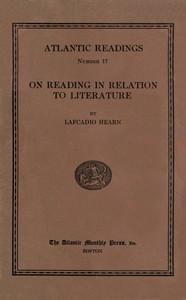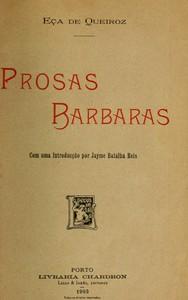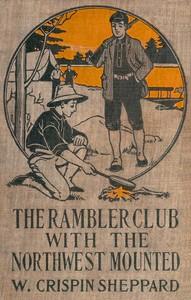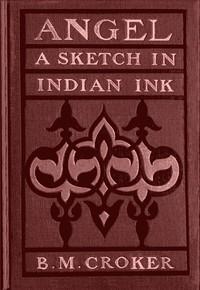|
|
Read this ebook for free! No credit card needed, absolutely nothing to pay.Words: 28764 in 14 pages
This is an ebook sharing website. You can read the uploaded ebooks for free here. No credit cards needed, nothing to pay. If you want to own a digital copy of the ebook, or want to read offline with your favorite ebook-reader, then you can choose to buy and download the ebook.

: On reading in relation to literature by Hearn Lafcadio - Literature; Books and reading@FreeBooksThu 08 Jun, 2023 ATLANTIC READINGS NUMBER 17 ON READING IN RELATION TO LITERATURE BY LAFCADIO HEARN
The Atlantic Monthly Press, Inc. BOSTON For, to read the characters or the letters of the text does not mean reading in the true sense. You will often find yourselves reading words or characters automatically, even pronouncing them quite correctly, while your minds are occupied with a totally different subject. This mere mechanism of reading becomes altogether automatic at an early period of life, and can be performed irrespective of attention. Neither can I call it reading, to extract the narrative portion of a text from the rest simply for one's personal amusement, or, in other words, to read a book "for the story." Yet most of the reading that is done in the world is done in exactly this way. Thousands and thousands of books are bought every year, every month, I might even say every day, by people who do not read at all. They only think that they read. They buy books just to amuse themselves, "to kill time," as they call it; in one hour or two their eyes have passed over all the pages, and there is left in their minds a vague idea or two about what they have been looking at; and this they really believe is reading. Nothing is more common than to be asked, "Have you read such a book?" or to hear somebody say, "I have read such and such a book." But these persons do not speak seriously. Out of a thousand persons who say, "I have read this," or "I have read that," there is not one perhaps who is able to express any opinion worth hearing about what he has been reading. Many and many a time I hear students say that they have read certain books; but if I ask them some questions regarding the book, I find that they are not able to make any answer, or at best, they will only repeat something that somebody else has said about what they think that they have been reading. But this is not peculiar to students; it is in all countries the way that the great public devours books. And to conclude this introductory part of the lecture, I would say that the difference between the great critic and the common person is chiefly that the great critic knows how to read, and the common person does not. No man is really able to read a book who is not able to express an original opinion regarding the contents of a book. No doubt you will think that this statement of the case confuses reading with study. You might say, "When we read history or philosophy or science, then we do read very thoroughly, studying all the meanings and bearings of the text, slowly, and thinking about it. This is hard study. But when we read a story or a poem out of class-hour, we read for amusement. Amusement and study are two different things." I am not sure that you all think this; but young men generally do so think. As a matter of fact, every book worth reading ought to be read in precisely the same way that a scientific book is read--not simply for amusement; and every book worth reading should have the same amount of value in it that a scientific book has, though the value may be of a totally different kind. For, after all, the good book of fiction or romance or poetry is a scientific work; it has been composed according to the best principles of more than one science, but especially according to the principles of the great science of life, the knowledge of human nature. In regard to foreign books, this is especially true; but the advice suggested will be harder to follow when we read in a language which is not our own. Nevertheless, how many Englishmen do you suppose really read a good book in English? how many Frenchmen read a great book in their own tongue? Probably not more than one in two thousand of those who think that they read. What is more, although there are now published every year in London upwards of six thousand books, at no time has there been so little good reading done by the average public as to-day. Books are written, sold, and read after a fashion--or rather according to the fashion. There is a fashion in literature as well as in everything else; and a particular kind of amusement being desired by the public, a particular kind of reading is given to supply the demand. So useless have become to this public the arts and graces of real literature, the great thoughts which should belong to a great book, that men of letters have almost ceased to produce true literature. When a man can obtain a great deal of money by writing a book without style or beauty, a mere narrative to amuse, and knows at the same time that if he should give three, five, or ten years to the production of a really good book, he would probably starve to death, he is forced to be untrue to the higher duties of his profession. Men happily situated in regard to money matters might possibly attempt something great from time to time; but they can hardly get a hearing. Taste has so much deteriorated within the past few years, that, as I told you before, style has practically disappeared--and style means thinking. And this state of things in England has been largely brought about by bad habits of reading, by not knowing how to read. For the first thing which a scholar should bear in mind is that a book ought not to be read for mere amusement. Half-educated persons read for amusement, and are not to be blamed for it; they are incapable of appreciating the deeper qualities that belong to a really great literature. But a young man who has passed through a course of university training should discipline himself at an early day never to read for mere amusement. And once the habit of the discipline has been formed, he will even find it impossible to read for mere amusement. He will then impatiently throw down any book from which he cannot obtain intellectual food, any book which does not make an appeal to the higher emotions and to his intellect. But on the other hand, the habit of reading for amusement becomes with thousands of people exactly the same kind of habit as wine-drinking or opium-smoking; it is like a narcotic, something that helps to pass the time, something that keeps up a perpetual condition of dreaming, something that eventually results in destroying all capacity for thought, giving exercise only to the surface parts of the mind, and leaving the deeper springs of feeling and the higher faculties of perception unemployed. Of course this is an extreme case; but it is the ultimate outcome of reading for amusement whenever such amusement becomes a habit, and when there are means close at hand to gratify the habit. At present in Japan there is little danger of this state of things; but I use the illustration for the sake of its ethical warning. This does not mean that there is any sort of good literature which should be shunned. A good novel is just as good reading as even the greatest philosopher can possibly wish for. The whole matter depends upon the way of reading, even more than upon the nature of what is read. Perhaps it is too much to say, as has often been said, that there is no book which has nothing good in it; it is better simply to state that the good of a book depends incomparably more for its influence upon the habits of the reader than upon the art of the writer, no matter how great that writer may be. In a previous lecture I tried to call your attention to the superiority of the child's methods of observation to those of the man; and the same fact may be noticed in regard to the child's method of reading. Certainly the child can read only very simple things; but he reads most thoroughly; and he thinks and thinks untiringly about what he reads; one little fairy tale will give him mental occupation for a month after he has read it. All the energies of his little fancy are exhausted upon the tale; and if his parents be wise, they do not allow him to read a second tale, until the pleasure of the first, and its imaginative effect, has begun to die away. Later habits, habits which I shall venture to call bad, soon destroy the child's power of really attentive reading. But let us now take the case of a professional reader, a scientific reader; and we shall observe the same power, developed of course to an enormous degree. In the office of a great publishing house which I used to visit, there are received every year sixteen thousand manuscripts. All these must be looked at and judged; and such work in all publishing houses is performed by what are called professional readers. The professional reader must be a scholar, and a man of very uncommon capacity. Out of a thousand manuscripts he will read perhaps not more than one; out of two thousand he may possibly read three. The others he simply looks at for a few seconds--one glance is enough for him to decide whether the manuscript is worth reading or not. The shape of a single sentence will tell him that, from the literary point of view. As regards subject, even the title is enough for him to judge, in a large number of cases. Some manuscripts may receive a minute or even five minutes of his attention; very few receive a longer consideration. Out of sixteen thousand, we may suppose that sixteen are finally selected for judgment. He reads these from beginning to end. Having read them, he decides that only eight can be further considered. The eight are read a second time, much more carefully. At the close of the second examination the number is perhaps reduced to seven. These seven are destined for a third reading; but the professional reader knows better than to read them immediately. He leaves them locked up in a drawer, and passes a whole week without looking at them. At the end of the week he tries to see whether he can remember distinctly each of these seven manuscripts and their qualities. Very distinctly he remembers three; the remaining four he cannot at once recall. With a little more effort, he is able to remember two more. But two he has utterly forgotten. This is a fatal defect; the work that leaves no impression upon the mind after two readings cannot have real value. He then takes the manuscripts out of the drawer, condemns two , and re-reads the five. At the third reading everything is judged--subject, execution, thought, literary quality. Three are discovered to be first class; two are accepted by the publishers only as second class. And so the matter ends. Free books android app tbrJar TBR JAR Read Free books online gutenberg More posts by @FreeBooks
: Prosas barbaras com uma introducção por Jayme Batalha Reis. by Queir S E A De Batalha Reis Jaime Editor - Portuguese fiction 19th century; Short stories Portuguese@FreeBooksThu 08 Jun, 2023
|
Terms of Use Stock Market News! © gutenberg.org.in2025 All Rights reserved.






